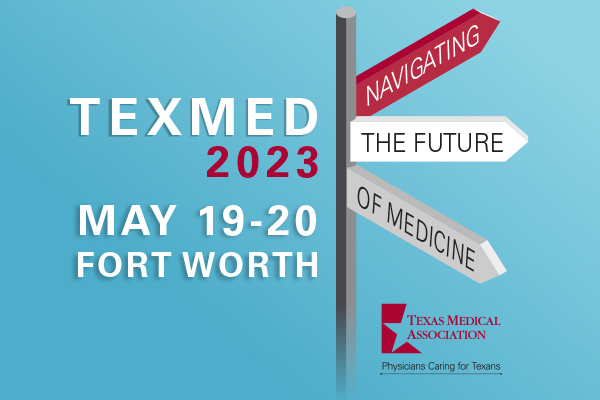
Physicians must step up to become strong leaders who embrace patient-centered change while making sure trends in areas like technology and the management of medicine don’t threaten physician autonomy or the focus on patient care.
That was the message Ted James, MD, associate professor of surgery at Harvard Medical School, delivered to Texas physicians at the opening session of TexMed 2023 May 19 in Fort Worth.
Leading people through innovative change can be tough because it’s a high-stakes endeavor that can go too far. And, by definition, change requires loss or letting go, said Dr. James, who also heads up professional and executive leadership development programs at Harvard Medical School, the Institute for Healthcare Improvement, and the Association of American Medical Colleges.
“But the biggest reason is that change fundamentally is uncomfortable,” he said in his keynote speech, “Navigating the Future of Medicine.” “We like our routines.”
Dr. James saw the impact of patient-centered innovation early in his career at an academic hospital in Vermont. The hospital knew it needed to improve patient outcomes but had few resources to devote to making that happen, Dr. James says.
“It required redesigning entire processes of care, retraining staff, finding funding in order to buy resources,” he said. “It was quite an undertaking, but the team was relentless. They implemented technology, they implemented systems. Little by little they started to see the fruits of their labor.”
The improvement this created was summed up in a letter Dr. James received from a young woman who underwent surgery, chemotherapy, and radiation for breast cancer. She said the care and compassion she received made her feel she could get through the ordeal.
“She actually wrote that, in a strange way, the team made her cancer a positive experience,” Dr. James said.
Achieving that kind of change requires physician leaders who can guide staff members and identify their levels of capacity and commitment. Those with the most capacity and commitment, whom he labels “champions,” should be engaged as much as possible. Those who have strong commitment to the team’s goals but less capacity, whom he calls “enthusiasts,” should be coached and educated. Those who have capacity but weak commitment are “skeptics” who need to be influenced and brought along. And those who have both low capacity and commitment are “obstructors” who should be held accountable by establishing expectations and consequences.
But physician leaders must have patience with obstructors because, in many cases, these people are not hostile to the team’s goals but simply burned out, Dr. James cautions. They may need help with their deeper problems.
“We need to have a culture where we’re looking out for each other – where we have each other’s back,” he said.
During the question-and-answer period, Houston anesthesiologist Evan Pivalizza, MD, asked Dr. James how physicians can handle situations in which the roles are reversed – when they need to influence their superiors on matters of patient care.
“First of all, do not think of it as an adversarial relationship but an opportunity for education,” Dr. James responded. “A lot of these leaders may not understand what’s going on in our clinics or our operating rooms. … Bring those patient stories, bring those testimonies to the board, to the CEO, to the managers and help them understand how this is actually affecting patients, and a lot of times that will actually get them on board and to open up that conversation.”
Dr. James said medical organizations like the Texas Medical Association and TEXPAC, TMA’s political action committee, are vital for maintaining physician leadership because they have a big impact on preserving patient care and physician autonomy on issues like scope of practice and liability reform.
But, he pointed out, “it’s interesting to note that lawyers on average contribute a lot more to their PACs than physicians do.”
Physician leadership also is needed in areas like technology, Dr. James says. Many physicians are concerned about augmented – or artificial – intelligence (AI), which involves using computer-run algorithms to do things human brains cannot. AI learns from the data it receives and makes predictions.
“AI is going to play a major role in medicine, [but] it’s not going to replace physicians,” he said. “Patients are still going to want that human interaction, the human touch.”
But as with all technological developments, physicians must be in leadership positions precisely so they can help direct how this valuable technology is used, he says.
“What I do see is physicians being empowered by AI – being empowered to make better decisions, faster decisions.”
Ballinger emergency physician Brad Bundrant, MD, said during the question period that he sees corporate medicine causing a greater lack of community among physicians.
“How do we make people realize it is [their time] to be involved in community and to do things that don’t necessarily have an immediate payout?” he asked.
Dr. James suggested that physicians should have coffee with those colleagues and explain their own experiences.
“They need to understand that without a strong community and some sense of physician independence and autonomy, we’re really as much at risk as someone working at a convenience store,” he said. “And we don’t want to become a commodity. We don’t want to see the commoditization of medicine.”